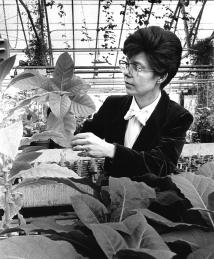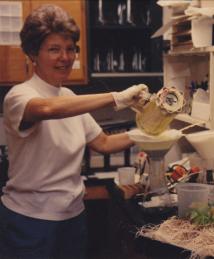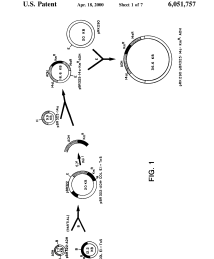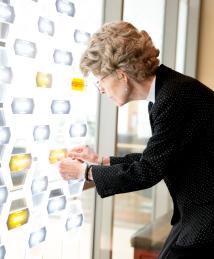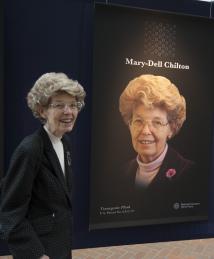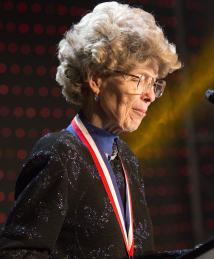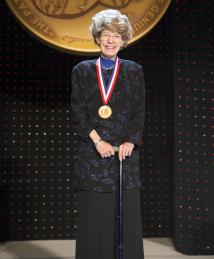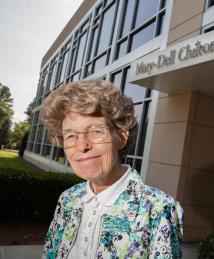Mary-Dell Chilton
"You can’t stop me. When I’m after something, I work on it endlessly until I get it."
Mary-Dell Chilton is one of the founders of modern plant biotechnology. She led the research team that produced the first transgenic, or genetically engineered, plants in 1983, and her groundbreaking research has made major contributions to agriculture.
Born in Indianapolis in 1939, Chilton has been driven by curiosity and passionate about science since her youth. As a high school student, she was named a finalist in the Westinghouse (now Regeneron) Science Talent Search. In 1956, she enrolled at the University of Illinois to study chemistry. She began taking an interest in molecular biology when she picked up a course called “The Chemical Basis of Biological Specificity,” taught by Benjamin Hall, Sol Spiegelman and Noboru Sueoka, who were at the forefront of this growing field.
Chilton received her bachelor’s degree in 1960 and her doctorate in 1967, both in chemistry. In an interview with the National Inventors Hall of Fame®, she said, “When I was a graduate student, we were just beginning to work out the genetic code, and I was tickled to death by the experiments that people were doing to determine what the code was. I was fascinated. I fell in love.”
While working toward her doctorate, Chilton focused her thesis on bacterial transformation – bacteria’s ability to manipulate DNA. Her research showed that these bacterial capabilities needed a close DNA match between the donor and recipient DNA. She was immediately intrigued when she learned of studies that showed a type of bacteria called agrobacterium could transfer its DNA to plants it infected.
Following her graduation, Chilton joined the faculty of the University of Washington, leading a research team that would shape plant genetic research. In 1976, her team demonstrated that a bacterial cell could transfer DNA into a plant cell. Their discovery advanced the emerging field of agricultural biotechnology, as scientists raced to determine how the genes are integrated into a plant's genome, as well as the ways in which this could be used in real-world applications.
“We had to perform the experiment repeatedly because the outcome was so surprising,” Chilton said. “The feeling that engendered amongst the team members was something very special. We’ve looked for it in other places and other times later in our careers, but nothing has ever really been quite the same.”
Chilton moved to Washington University in St. Louis in 1979 to continue her work, demonstrating with her team that genes responsible for disease could be removed from the bacterium without taking away its ability to transfer other genes into a plant cell. In 1982, she led the first research team to successfully transfer a gene of their choice into tobacco plants with the application of agrobacterium. Her team eventually grew the genetically modified cells into the first transgenic plants with the help of Andrew Binns of the University of Pennsylvania, showing that the trait was passed on to their progeny.
In 1983, Chilton moved to North Carolina and became the founding director and vice president of the Biotech Research Center within Ciba-Geigy, which later became Syngenta Biotechnology, a global leader in biotechnology. At Syngenta, Chilton built one of the world's foremost industrial agricultural biotechnology programs, making it possible to develop crops with increased yields, resistance to insects and disease, and the ability to tolerate adverse environmental conditions such as drought.
Discussing her ongoing persistence in making scientific progress, Chilton said, “You can’t stop me. When I’m after something, I work on it endlessly until I get it.” To encourage the same sense of determination in the next generation, Chilton served as a mentor to the many international science students she and her husband Scott Chilton hosted at their family residence, known as the “Chilton Hilton.”
For her revolutionary work, which has paved the way for modern scientific control over the genetic code, as well as crop improvement by genetic engineering, Chilton has received many awards, including the Benjamin Franklin Medal in Life Sciences in 2002, the World Food Prize in 2013 and the National Medal of Technology and Innovation in 2023. In 2018, Chilton retired from Syngenta, where her legacy continues through the Syngenta Seeds’ R&D program.
